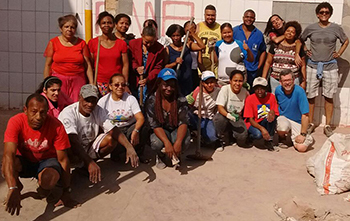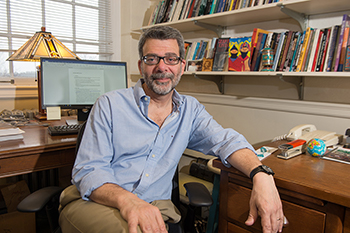Border Hopping
February 9, 2018
Related:
From Maxwell Perspective...
Border Hopping
Anthropologist John Burdick is not only a faculty member conducting research overseas (like so many others). His research team, in fact, spans the globe.
By Renée K. Gadoua
 John Burdick in Brazil (first row, far right), with residents of one of the five housing projects his team is studying.
John Burdick in Brazil (first row, far right), with residents of one of the five housing projects his team is studying.At 10 a.m. EST March 15, John Burdick signed into a monthly Google Hangout with his seven-member team studying social housing projects in Rio de Janeiro. It was 8 a.m. in Utah; that’s where project manager Melinda Gurr, an anthropology graduate student, lives. It was 3 p.m. in London, England, where co-PI Jeffrey Garmany lives, and noon in Rio, home to four team members.
“We had to work this out because Jeff had dinner plans, and our meetings last three to five hours,” says Burdick, who has studied urban social movements in Brazil since the 1980s. “Melinda was drinking her morning coffee, while it was afternoon for him.”
Burdick, professor of anthropology, is leading a longitudinal, multi-year study of affordable housing in the center of Rio de Janeiro. His team is tracking five projects trying to help the poor continue to live in Rio’s old port area downtown. The district lies in the city’s major planned “revitalization,” spurred by Brazil’s international role hosting the 2014 World Cup and the 2016 Summer Olympics.
“Poor people are leaving and rich people are arriving,” Burdick says. Brazil is famous for corruption and inefficiency, he says, but “the development has been transformational. There are great improvements in areas tourists have tended to stay away from. It is changing very rapidly.”
The study is international not only in its focus on that South American nation, but in its international roster of experts from three countries. Make that four countries: Burdick is also working with a Canadian filmmaker, who is producing a 30-minute documentary about the project. Even the grantors are international: the U.S. National Science Foundation (NSF) and the Economic and Social Research Council of the United Kingdom.
 John Burdick in his Maxwell Hall office.
John Burdick in his Maxwell Hall office.International research is challenging. “It took a year to get the team together,” Burdick says. It requires openness and a sense of adventure. It involves tedious tasks like tracking time zones and ensuring reliable, secure internet access. Burdick’s team is paid in different currency from two grantors, for example. And two Brazilian team members worked on outdated computers that couldn’t handle the project’s data. The NSF grant paid for new laptops.
Rio’s housing problems have existed since the end of Brazil’s authoritarian military dictatorship in 1985, and the economic growth and development of the last decade have exacerbated the situation. As Brazil prepared for the 2016 Olympics, the government invaded, occupied, and “pacified” 30-plus shantytowns, removing drug lords to make the area safer for tourists. Several thousand families — mostly poor and working class people — were forcibly displaced.
“The outsiders would call them slums,” Burdick says. “They call them home. They’re very vital neighborhoods.”
Burdick’s team interviews residents, attends community meetings and protests, and talks with municipal leaders to see how different housing models affect people’s economic circumstances, relationships, and livelihoods.
Local ties and knowledge are key to the researchers’ “street cred,” Burdick says. The Brazilian team includes two anthropologists, a sociologist/urban planner, and a housing rights activist. The activist’s “presence has opened up every door in the housing movement” and the sociologist “knows the politics inside and out.”
This project grows out of Burdick’s love of Brazil, which dates to 1985, when he studied liberation theology and the progressive Catholic movement there. “At that time, Brazil was one of the only societies where it was possible to do that without high risk,” he says. In the 1990s, Burdick studied Brazil’s anti-racism movement. In 1996, he and his wife spent a year in Brazil with their young children. He still finds the country “endlessly fascinating.”
Burdick stays abreast of political developments in Brazil. “I know the dangers and restrictions on their freedom,” he says. “I’ve been shoulder to shoulder at demonstrations where we’ve looked down the barrel of a gun.”
"This is not just about the U.S. and Brazil, but about forces unfolding all over the world. "
John Burdick
As the project lead, Burdick sometimes feels “like the employer with the time clock,” enforcing personnel and accounting policies. “Since I’m so immersed in Brazilian culture, I can have humor about it,” he says. “When the team’s paychecks are late, I blame both U.S. and Brazilian bureaucracies.” But he can’t be too bureaucratic. “The reason these calls go so long is the first half hour is chatting,” he says. “We talk about their families and the political situation. It wouldn’t work in Brazilian culture if I said, ‘Boom, let’s start the meeting.’”
Understanding local politics allows him to ask good research questions; it also helps him build trust and respect within his team. “It’s important for me to convey that this is not just about the U.S. and Brazil, but about forces unfolding all over the world,” he says.
Photo Credit, photo of John Burdick: Steve Sartori/S.U. Photo & Imaging Center
This article appeared in the spring 2017 print edition of Maxwell Perspective; © 2017 Maxwell School of Syracuse University.